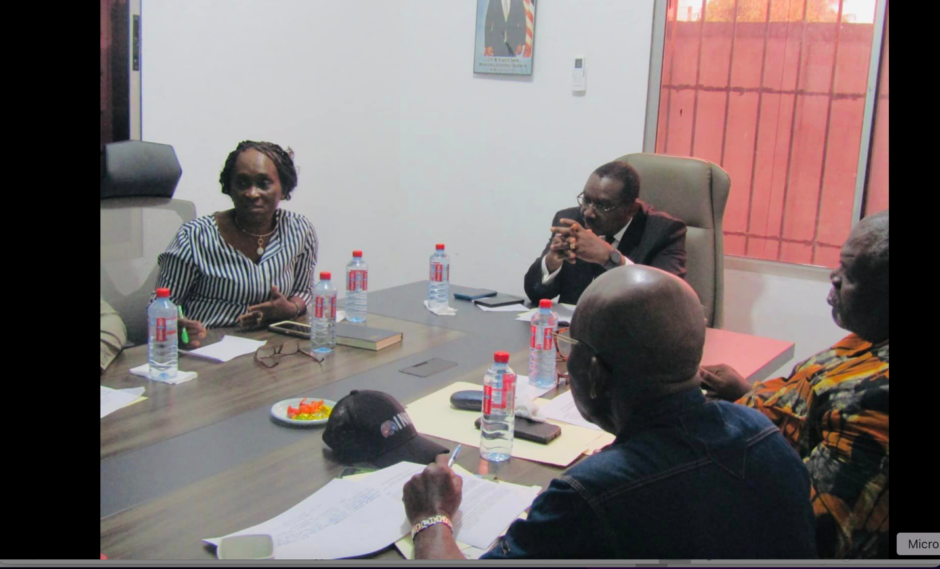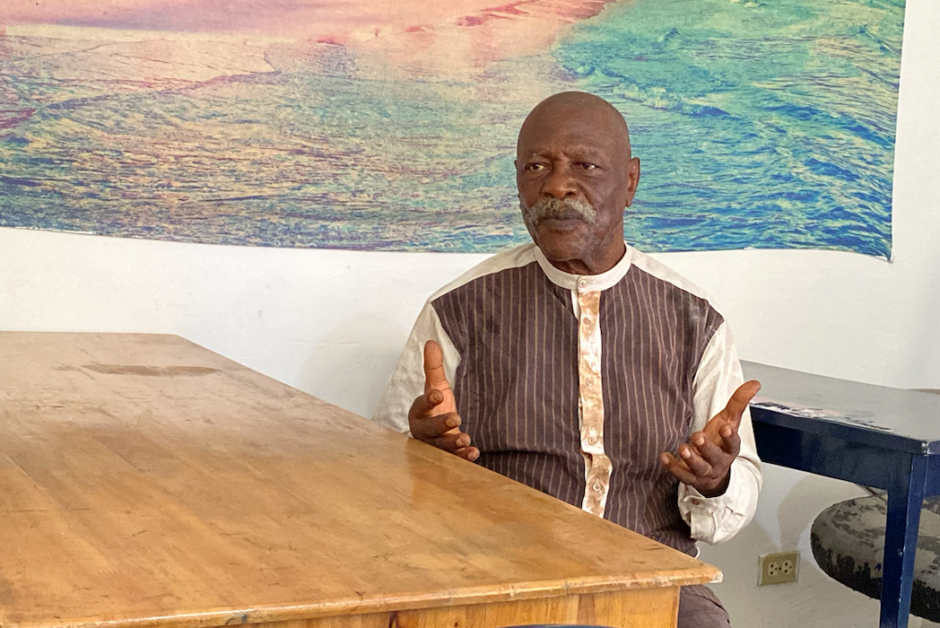
The presidential vetting committee, chaired by Cllr. Oswald (in suit), Liberia’s Justice Minister, has come under fire over its alleged lack of transparency. Credit: Justice Ministry.
MONROVIA, Liberia —A whirl of speculation has clouded the work of the special presidential committee tasked with shortlisting candidates for the position of Executive Director of Office of War and Economic Crimes Courts of Liberia. Daniel Sando, Deputy Information Minister, told a weekly press conference last Thursday “that there are eight candidates who have been shortlisted.”
Mr. Sando shot down a Daily Observer article, naming five people who the paper said had been shortlisted. However, one of the candidates named in the story, Cllr. Jerome Verdier, an ex-Chairman of Liberia’s Truth and Reconciliation Commission (TRC), has confirmed in a whatsapp exchange, that he had been contacted by the committee.
“Yes, they reached out to me and told me I was shortlisted to be interviewed,” said Cllr. Verdier.
Another of those named, Massa Washington, a former TRC commissioner, said she had not been contacted. Madam Washington confirmed she had not applied for the position but had heard that she had been nominated by a victims’ group.
The three others named – Dr. Jallah A. Barbu, Dean of the Louis Arthur Grimes School of Liberia, a constitutional law scholar and chair of the special committee of the Bar Association that drafted the bill for the courts, Cllr. James Verdier, a brother of Jerome, who previously headed the Liberia Anti-Corruption Commission, and Cllr. Boakai Kanneh, who heads the Law Reform Commission – did not respond to New Narratives/Front Page Africa requests for comment.
No one on the committee responded to requests for comment.
The secrecy of the committee’s actions has again sparked concern among civil society groups who had led the campaign to persuade President Joseph Boakai to fire his previous appointee, Jonathan Massaquoi, because of a lack of transparency in the process. President Boakai appointed this new committee with the promise of being more inclusive this time around.
Mr. Sando rejected the criticism.
“The committee says, to avoid any kind of external influence on the process, they are not releasing the names of those individuals that are participating,” said Mr. Sando. “They also do not confirm the names that are being released by some media institutions. And that is the way they want to avoid interference. Three names out of this process will be presented to the president and then the president will select and appoint one of the three names. His Excellency, the president and the entire government remain commitment to the establishment of the war and economic crimes courts for Liberia.”
Aside from its first meeting in early September – photos from the gathering were posted on Facebook by the justice ministry – the committee has released no information about the committee’s activities, including meeting dates, candidates’ nominations, interviews and shortlisting. This has concerned court advocates.
“I don’t think there was sufficient public participation, going by the experience of the TRC, where commissioners were nominated by the public,” said John Stewart, an ex-commissioner of Liberia’s TRC in a phone interview. “The public was asked to send in nominations of individuals they believed that had the character and competence to serve as TRC commissioners.”
“If you’re asking people to apply, the notice has to be publicly announced and carried for a sustained period of time to create sufficient awareness. The Inquirer [where the criteria was published] is not as widely read as FrontPage Africa and the Daily Observer, which are the two leading newspapers in the country. I don’t recall hearing anything of such on national radio.”

Mr. Stewart is one of several advocates who have criticized the committee’s failure to revise the requirements for the candidate in the initial job description. A master’s degree in law is a particular point of contention. Madam Washington does not possess that qualification, for instance, neither does Tiawan Gongloe, a widely respected human rights lawyer often named as a contender for the role. Many think it is unnecessary for a role that, they say, will be primarily administrative and where the trust of victims is imperative.
“What is required most of that person to head the secretariat are competence and character,” said Mr. Stewart. “That person does not necessarily have to be a lawyer. You will have the backing of a corps of lawyers.”
“In Liberia’s state and nation building endeavor, three professions have reigned supreme: politics, religion and law,” said Mr. Aaron Weah, another critic and a scholar of transitional justice, in a recent piece. “The criteria insisting that the executive director is a trained Liberian lawyer limits the opportunity to recruit a more ideal chief of administration.”
Mr. Weah joined others who have been critical of the committee’s makeup. He said it was regretful that the Economic Community of West African States (ECOWAS) and United Nations Human Rights Office (OHCHR) withdrew from the process to allow greater Liberian ownership. That left the Ministry of Justice in charge, along with members of the Independent Human Rights Commission of Liberia, Liberia National Bar Association, Liberia civil society and the Director of Cabinet. He criticized the absence of victims’ groups.
“The withdrawal of the OHCHR and ECOWAS as critical oversight may bring full circle the elite conflict within the presidency and within civil society,” said Mr. Weah.
The inclusion of Cllr. Jerome Verdier on the shortlist has concerned activists who are counting on strong US support for technical and funding support for the courts. Cllr. Verdier has been an outspoken critic of Beth Van Schaack, the US Ambassador-at-large for Global Criminal Justice, making allegations against her that she has denied and which have been rejected by courts in three countries. Sources in the US government, who requested anonymity to discuss sensitive matters, say Amb. Van Schaack has been one of the biggest advocates for support Liberia’s courts within the Biden administration. They are concerned US support may evaporate if she leaves the role during the change of US administrations in January.
Despite being shortlisted, Cllr. Verdier was also critical of the committee.
The panel, “could have been more open and transparent by: 1. Announcing to the public that applications have closed 2. Announced how many applications were received 3. Make a full disclosure of applicants and applications received,” said Cllr. Verdier. He urged the committee to disclose the vetting standards used for the selection process, the names of shortlisted candidates and when the process will conclude. “Accountability and impunity should not be a perennial contest – justice and accountability must win over corruption and impunity.”
This story is a collaboration with FrontPage Africa as part of the West Africa Justice Reporting Project. Funding was provided by the Swedish embassy in Liberia. The funder had no say in the story’s content.
